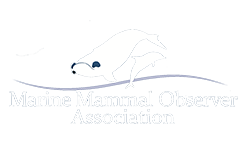Using suitably qualified MMOs and thorough methodology
The Marine Mammal Observer Association (MMOA) maintains that to maximise the value of data collected during mitigation surveys, it is essential for MMOs and PAM Operators to be suitably qualified, experienced and dedicated. Any data that are to be scientifically analysed need to have been collected using a structured, standardised methodology and then should be fully assessed for data quality before analysis can begin. Meaningful analyses should only include data collected by people with proven species identification skills, an appreciation for the necessity for correctly recording effort status and weather conditions, and good distance estimation skills. Using inexperienced persons and individualised data collection methodologies will lessen scientific credibility.
Data recording by MMOs and PAM operators
Data recording should be diligent and accurate. The use of standardised forms (see below) is encouraged. MMOs and PAM operators should liaise with the crew to record accurate and complete operational data. They should ensure that effort records accurately reflect the times of monitoring and weather conditions throughout. Records of sightings or acoustic detections should include as much detail as can confidently be given (e.g. identifications should only be to species level if there is confidence in the identification). The MMOA encourages MMOs and PAM operators to check their data thoroughly prior to submission for use, including crossreferencing between forms (e.g. checking that times of source activity agree between operations, effort and sightings forms).
Use of photographs to improve MMO data quality
MMO data quality may be improved if photographs of sightings are collected when possible and stored (bearing in mind that it is not possible to photograph every sighting because animals are often seen briefly or at distance or in inclement weather conditions). The collection of supporting images allows later independent verification of the sightings, especially in terms of species identification. This is particularly important in areas or for species where little information exists on marine mammal distribution, or for species where identification is challenging. However, obtaining photographs of animals should never be at the expense of data collection. Where photographs are taken these should be submitted with MMO reports, noting that file size should not be excessive, to enable their use for scientific purposes.
Collating PAM detection recordings and noise samples
Retaining and collating recordings of PAM detections and samples of sound is not a widespread requirement with regulators. The MMOA encourages Clients to specifically request that recordings of every PAM detection are made and stored during a survey, so that independent verification of the data can occur at a later time and the use of the data be maximised. This process will also facilitate assessment of the signal-to-noise ratio and other recording parameters experienced during PAM surveys with a view to assessing the likely potential for detections to have occurred on the system.
MMO and PAM data analysis
Analysis of the data collected during mitigation surveys should be carried out by individuals/organisations that have a full understanding of the limitations of current MMO andPAM datasets. Datasets collected by multiple personnel of varying skill levels are inherently subject to wide variation in standards. Although this variation can be minimised to some extent through the use of standardised data collection methods and data forms, bias in detection rates and identification skills between observers is an acknowledged and fundamental issue for all large marine mammal surveys, and will be especially the case in large MMO/PAM datasets where data may originate from several hundred observers. Meaningful analyses are reliant on having an understanding of the varying quality of MMOs and PAM Operators being hired on projects and the limitations this creates (for example, the ability to account for interobserver variation during analysis). An assessment of which data are of scientific value can only be achieved if the data are accompanied by detailed descriptions of the methodology used, by supporting information allowing independent verification where appropriate (i.e. photographs or acoustic recordings) and an indication of whether the data were collected by dedicated, experienced and qualified MMOs and PAM Operators. All data, including that of experienced personnel, should be thoroughly checked using a rigorous quality control process prior to analysis and only good quality data should be used. Analysis should not be performed on data that has not undergone quality control.
Collating MMO and PAM datasets worldwide
The MMOA supports the standardisation of data collection methods and the data forms used to record data worldwide, in order to improve the value of global datasets. MMO and PAM data forms in an electronic version have been developed by the E&P Sound and Marine Life Joint Industry Programme (JIP) (www.soundandmarinelife.org), a body affiliated with the International Association of Oil and Gas Producers (IOGP). These forms have been adopted by, amongst others, the Joint Nature Conservation Committee (JNCC) in the United Kingdom. The data forms have been revised by JNCC following feedback from MMOs and PAM Operators working in the field. The MMOA encourages the adoption of these forms with their guidance notes, where appropriate, to improve the standardisation of MMO data worldwide. The forms can be found online at: https://hub.jncc.gov.uk/assets/e2a46de5-43d4-43f0-b296-c62134397ce4. To improve standardisation the forms should be used in their existing format and not altered.
In summary to maximise the value of MMO data for scientific purposes the data must be:
- Collected by suitably qualified and experienced MMOs and PAM Operators;
- Collected using a standardised methodology (e.g. through the use of the JNCC Marine Mammal Recording Forms);
- Checked for accuracy prior to submission;
- Quality-controlled by independent experienced personnel with an understanding of the data;
- Accompanied by photographs and acoustic recordings whenever possible for each visual or acoustic detection;
- Analysed by individuals/organisations that have a full understanding of how MMO and PAM data are collected, have been collected in the past and what the limitations are.
The potential uses of MMO data for scientific research purposes have resulted in some MMOs seeking permission from the Client to publish their own data from work on projects. The MMOA encourages this practice. Please refer to Position Statement 9 - The Use of Marine Mammal Observer (MMO) data for Scientific Publications – for further information

